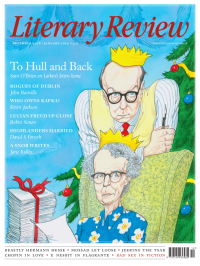Bernard Porter
Nordic Noir?
Sweden’s Dark Soul: The Unravelling of a Utopia
By Kajsa Norman
Hurst & Co 382pp £20
Sweden is a pretty well-regarded country on the whole. Even the Norwegians and Finns have forgiven her for lording it over them at one time. Among British social democrats she used to be regarded as a shining city on the hill: the ‘Swedish model’ meant open democracy, industrial cooperation, generous welfare, class, racial and gender equality, internationalism and the rest. Swedes bathed in this reputation. ‘Utopia’ is too strong a word for it, and there was plenty of internal criticism: from leftists wanting the country to be more utopian and from rightists objecting to the high taxation all this required. But in general the Swedes have felt pretty good about themselves. They are the living example that a society doesn’t need to be either red-in-tooth-and-claw capitalist or totally controlled by the state in order to prosper. There is a middle way.
Which leaves the red-in-tooth-and-claw guys somewhat at a loss. How can Sweden possibly be so happy and prosperous with virtually no religion, no handguns and very few prisons? The very thought is unsettling. As a result, right-wing Americans have been rubbishing Sweden for years. In February 2017, President Trump launched a notorious rant after seeing a Fox News report of a riot involving immigrants in Malmö: ‘Sweden! Who would believe this! Sweden!’ Those of us living there didn’t believe it, of course – because it wasn’t true. But it’s what the Right wants to hear. Swedish contentment is just a myth. Underneath the surface of clean streets, happy children, healthy adults and general politeness must lie something dark and threatening (and they don’t just mean the high price of beer).
This book will probably be regarded as grist to the sceptics’ mill. It’s by a native Swede who became bored with Sweden and went off to study more exciting places – she’s written about Afghanistan, Mali, Venezuela and South Africa – until an Afrikaner, irritated by what he

Sign Up to our newsletter
Receive free articles, highlights from the archive, news, details of prizes, and much more.@Lit_Review
Follow Literary Review on Twitter
Twitter Feed
Under its longest-serving editor, Graydon Carter, Vanity Fair was that rare thing – a New York society magazine that published serious journalism.
@PeterPeteryork looks at what Carter got right.
Peter York - Deluxe Editions
Peter York: Deluxe Editions - When the Going Was Good: An Editor’s Adventures During the Last Golden Age of Magazines by Graydon Carter
literaryreview.co.uk
Henry James returned to America in 1904 with three objectives: to see his brother William, to deliver a series of lectures on Balzac, and to gather material for a pair of books about modern America.
Peter Rose follows James out west.
Peter Rose - The Restless Analyst
Peter Rose: The Restless Analyst - Henry James Comes Home: Rediscovering America in the Gilded Age by Peter Brooks...
literaryreview.co.uk
Vladimir Putin served his apprenticeship in the KGB toward the end of the Cold War, a period during which Western societies were infiltrated by so-called 'illegals'.
Piers Brendon examines how the culture of Soviet spycraft shaped his thinking.
Piers Brendon - Tinker, Tailor, Sleeper, Troll
Piers Brendon: Tinker, Tailor, Sleeper, Troll - The Illegals: Russia’s Most Audacious Spies and the Plot to Infiltrate the West by Shaun Walker
literaryreview.co.uk